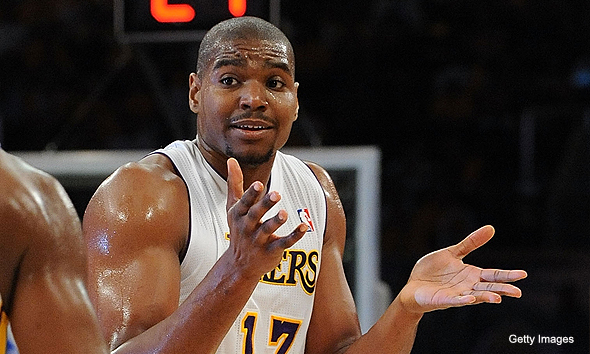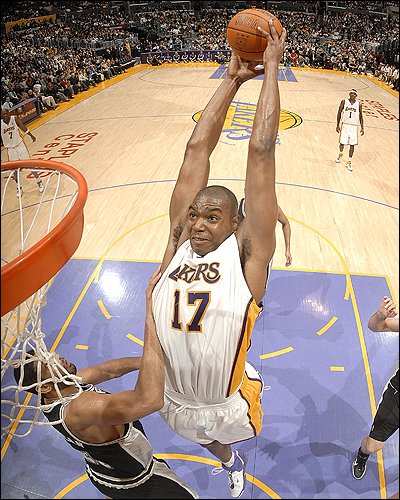

What did I do?
Only one game after controversially benching Kobe Bryant during a key fourth-quarter stretch, Lakers head coach Mike Brown felt forced to do something similar with All-Star center Andrew Bynum on Tuesday. Bynum, a seven-footer who has taken eight three-pointers in his entire NBA career, took an ill-advised (and let’s be honest…all Bynum outside shots are ill-advised) three point shot during the Lakers 104-101 win over the Golden State Warriors. It barely touched the rim, missing by a mile. Incensed, Brown immediately called Bynum to the bench and put in a substitute. Bynum did go back into the game after a stretch, but the benching was clearly punishment for a shot the sanity of which the play-by-play announcers questioned during its flight. So far, this is uninteresting. Anyone who’s ever played basketball has probably been pulled out of a game by a frustrated coach, and moreover, everyone who’s ever played basketball has probably, at one point or another, deserved it. It’s what Bynum said to reporters after the game that has raised eyebrows.
 “I don’t know what was bench-worthy about the shot, to be honest with you,” said the Lakers’ big man. “I made one [Sunday], and I wanted to make another one. That’s it. I guess he took offense to it, so he put me on the bench.”
“I don’t know what was bench-worthy about the shot, to be honest with you,” said the Lakers’ big man. “I made one [Sunday], and I wanted to make another one. That’s it. I guess he took offense to it, so he put me on the bench.”
“I’m good,” Bynum said. “I guess it’s ‘Don’t take threes’ is the message, but I’m going to take another one and I’m going to take some more, so I just hope it’s not the same result. Hopefully, I make it.”
So there you have it: message received, and message ignored. People think that punishment will correct behavior. Andrew Bynum’s postgame comments illustrate a competing (though more accurate) truth: punishment incites rebellion. The law (e.g. don’t shoot three-pointers if you don’t have a reasonable expectation of making them) asks for a certain behavior. Bynum got the request right: Don’t take threes. When it doesn’t get what it’s looking for, the law inflicts punishment, hoping that a program of reeducation will produce better results the next time. Unfortunately, as Christian theologians have always noted, the law is much better at asking for a result than it is at achievingit.
Martin Luther likened the relationship of the law to results to a lion held down by steel bands. The lion fights against the bands…and the tighter the bands become, the more viciously the lion fights. We fear freeing the lion because of the ferocity with which it strains, forgetting that all the while the lion is fighting the bands, not us. Released, the lion has nothing to struggle against, and will likely cease its struggling.
In the world of competitive basketball, of course, sitting a player on the bench for long enough may well break him of a bad habit. But so far, it’s having the reverse effect. Bynum is planning on launching more shots from long range, not fewer. As our view lengthens, though, and our scope expands, we might well note that even if Bynum is eventually benched enough to force him to stop shooting threes, won’t he consider his coach a ruthless tyrant and undermine him in other ways? Won’t he be much more likely to find another team in free agency (or at least threaten to do so unless Brown is fired)? Is the tightening of the bands on Andrew Bynum (though it might work on the surface) worth the damage it will surely cause to his fragile (i.e human) psyche?
Aren’t we all happier free, and isn’t it true that grace (e.g. the freedom to shoot) can provide the space to realize what it is we’re really good at, and allow us to settle into the behavior, by choice, that the law was asking for in the first place?

COMMENTS
5 responses to “When Is a Three Point Shot a Declaration of Independence?”
Leave a Reply














Nick
great comments as always . I wish you were mine and my husband’s pastor. He would knock down the doors to hear you and your amazing law/gospel sports talks!
two comments,
1. I think the greater danger of the law is that people congratulate themselves for keeping it. I don’t walk on the grass. I don’t take threes. These people agree with the law, and try to build their own righteousness (Romans 9:32-10:3) not by rebelling against the law but by using it to say that they are a-ok.
2. As a Laker fan, I would like to command Bynum to move his feet (and ass) on defense. I am willing to risk him feeling self-righteous about it, if he should actually start doing this!
Mark – That made me smile…wouldn’t Bynum’s ass naturally follow if he moves his feet? (I’m watching the Lakers/Thunder game right now and Bynum is playing very well) We ALL try to build our righteousness all the time (that’s the human endeavor; what Luther called the theology of glory) by lowering the standard of the law to achievable goals, like not walking on the grass and not shooting threes. The lower the standard, the easier the righteousness, and the greater the self-righteousness.
Robin – You’re too kind…I hope one or two of my ACTUAL parishioners feel the same way!
Nick, you’re the bomb. And not just because I know that you CAN hit the three:)
I like the article and am going to make a challenge on the function of the law here. What would you recommend the coach do here? What would you do if you were the coach in this situation? I would do exactly what Mike Brown did.
I would add that the law has a function to show us what a bunch of selfish, prideful punks we all are by our sinful nature. No offense to Lakers fans or Bynum, but his reaction reveals everything about Bynum: he is a selfish player who believes he is above the authority of the coach and the best interest of the team. Bynum will be a better basketball player and will be more of an asset to his team when he realizes that he is selfish and needs to play within the system that the coach has designed.
No, the law will not make Bynum a selfless player who submits to the authority of the coach. Only grace will change him. However, the function of the law- properly executed by Mike Brown- is to reveal our sinfulness and our need for change. It functions to bring us unto reality, a place where Bynum is not living in this situation. Everyone in the building, except Bynum, knows that he absolutely should not take that shot.
One would hope that sitting Bynum would open his eyes to his need to change and to play within the system. What would change him would be for Mike Brown to sit down face-to-face with Bynum after the game and show him love. (“Hey Andrew, you’re a great player and I appreciate how hard you work for this team. I know you want to win and that’s your motive in taking that shot. What I am trying to show you is that is not the best way for you to help us win. And, if you continue to be so defiant, you’re going to get a rep as a problem player and it’s going to hurt your career.”) Law and grace need to function together to change the player.